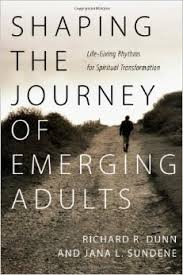
Photo Courtesy of Aaron Robert Photography. Copyright 2013. www.aaronrobertphotography.com
Last month, I shared how the church needs to think beyond mentoring to engage emerging adults. Mentoring often gives the impression of an omnidirectional relationship where one person gives and one receives. Our economic mindset has also set the image of a mentor as one who stands in authority over another, and who serves as a gatekeeper for wealth, knowledge, or fame.
The church needs to go beyond mentoring. Rather than succumbing to our western society which values independence, the church needs to rediscover its roots in our interdependence. God created the church to do more than gather together, but to need each other. One picture used regularly to illustrate the interdependence of the church is the body of Christ (see 1 Cor 12; Rom 12).
Christians should be seeking symbiotic relationships, where each partner benefits from the relationship without assumptions of power, rank, or importance. A symbiotic relationship is a connection that is for the mutual benefit of each individual. Here are some marks of symbiotic relationships:
Relational versus Programmatic

Photo Courtesy of Aaron Robert Photography. Copyright 2014. www.aaronrobertphotography.com
We were designed by God to be in relationships with others. Church leadership needs to manage less programs, and become more relationally perceptive. Shepherds need to see who within our community would naturally connect in symbiotic relationships.
In nature, symbiotic relationships develop because both animals see the need, and are drawn by the natural benefits of the relationship. Those seeking relationships must ask, “Who has God placed near me?” and “Who am I naturally drawn towards?”
Authentic versus Staged
In typical mentorships, the mentor must come with the gathering staged or set. Whether it is a set list of questions, a specific topic, or even to allow the meeting unplanned, the mentor feels responsible for setting the stage. When this responsibility is laid solely upon one member, it can lead to a lack of authenticity.
Symbiotic relationships still require intentionality, but the responsibility is shared. Intentionality turns hanging out with a friend into building spiritual intimacy. Someone must lead the discussion towards our faith, and then allow the Holy Spirit to steer the time towards sacred space.
Learning versus Teaching
In symbiotic relationships, participants approach the relationship saying, “What can I learn?” Teaching is the natural outflow of two different parts of the Body of Christ working together, occurring without a lesson plan as the Spirit speaks through His word, the conversation, and sharing life.
Purpose-giving versus Purpose-driven
Rarely do people want to be someone else’s purpose-driven spiritual project. Unfortunately, sometimes mentors believe that they know exactly what their partner needs. (For instance, “I need to show them…”, or “They need to learn…”). One individual controls the relationship rather than letting God work freely. God always set the agenda of symbiotic relationship.
Symbiotic relationships provide personal significance. Our motivation for the relationship is not because I am supposed to do it, but because I see how my life matters to another person. As we walk away from a symbiotic relationship, both people are thinking, “Wow, I needed that.”
Many people who use the term “mentor” have already moved beyond the stereotypical and possibly unhealthy uses of the role. Regardless of the term you use, as a member of the Body of Christ, seek interdependent relationships.
 Dr. G. David Boyd is the Founder and Managing Director of Emerging Adult Resources. He resides in Apple Valley, MN with his wife Rachel and three boys. If you would like to contact him, you can reach him at gdavid@earesources.org.
Dr. G. David Boyd is the Founder and Managing Director of Emerging Adult Resources. He resides in Apple Valley, MN with his wife Rachel and three boys. If you would like to contact him, you can reach him at gdavid@earesources.org.






 ast week, I shared some free on-line resources for parents of emerging adults. If you missed it, you can find it –
ast week, I shared some free on-line resources for parents of emerging adults. If you missed it, you can find it – 











 I found a great
I found a great ![tommy_portrait_blackwhite_690882_h[1]](http://www.earesources.org/wp-content/uploads/2013/09/tommy_portrait_blackwhite_690882_h1-300x199.jpg)
